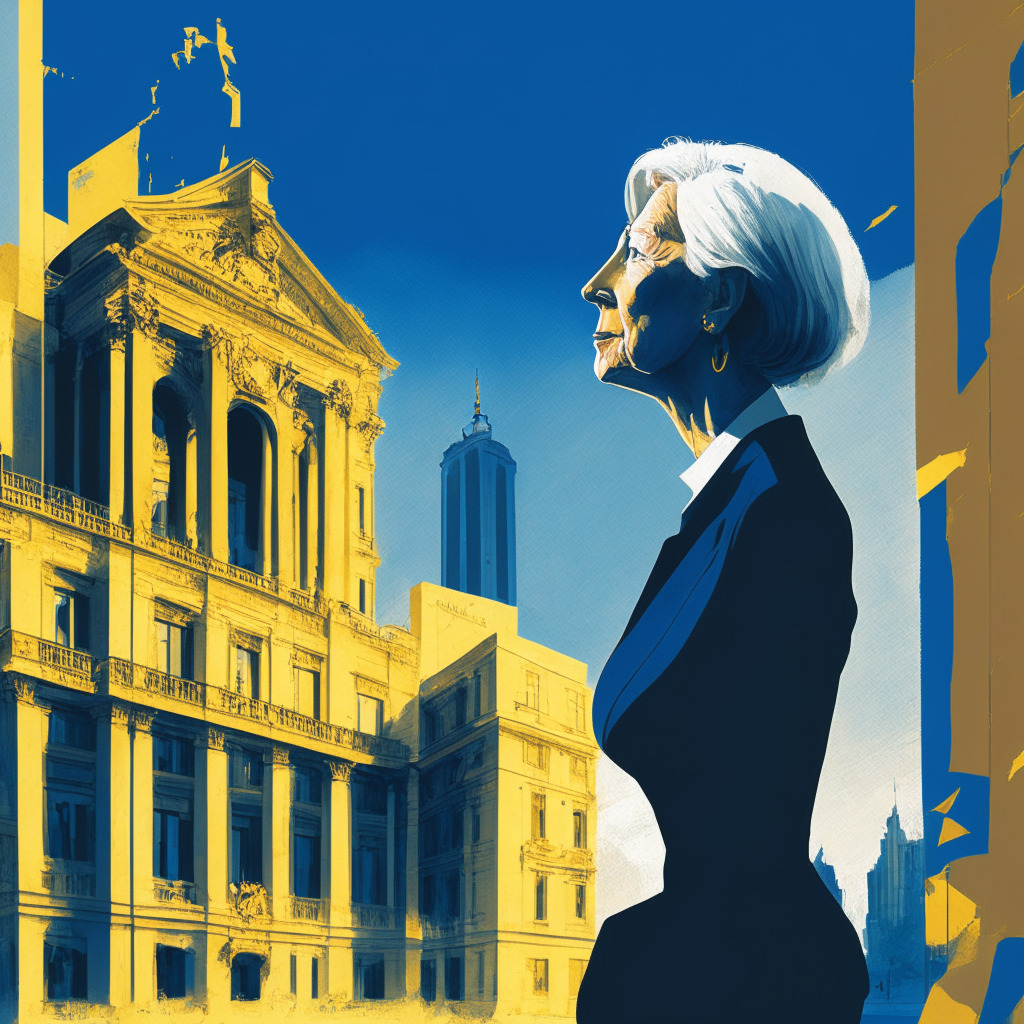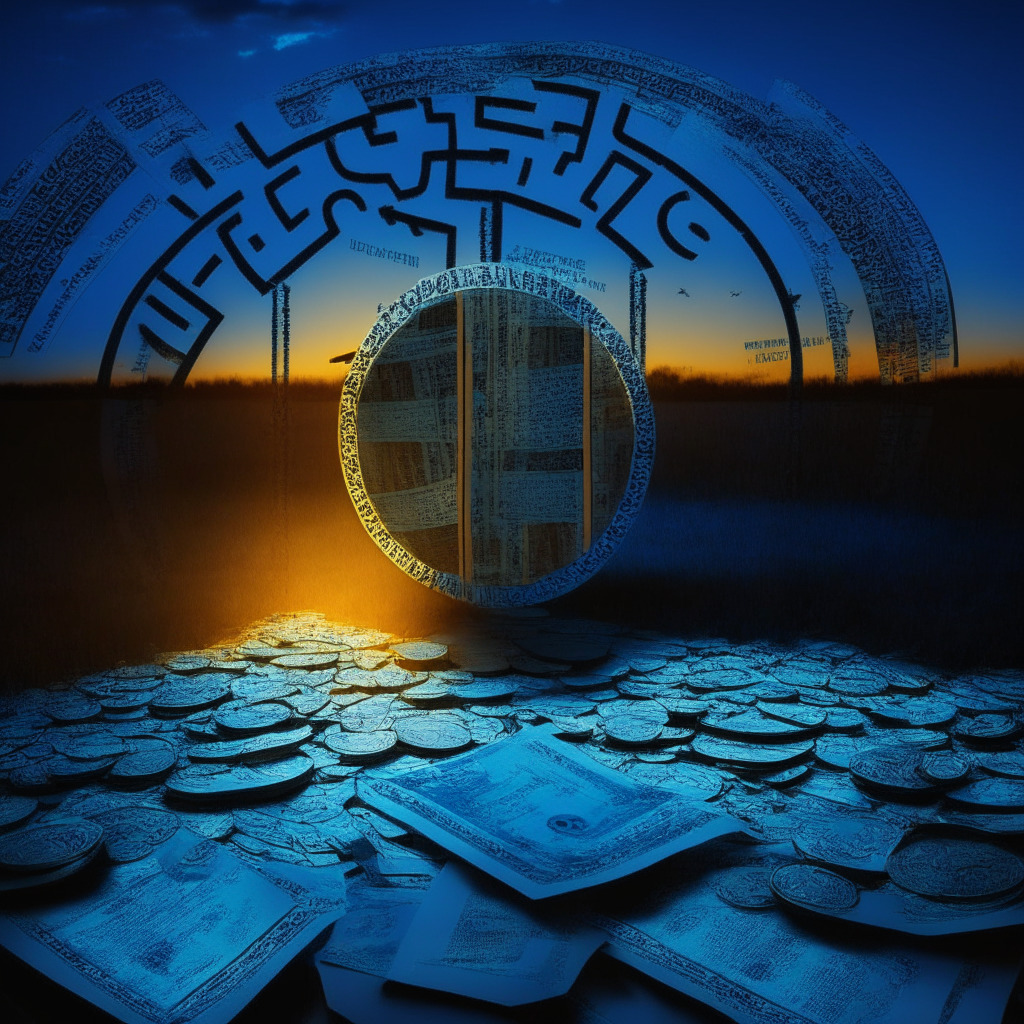The European Central Bank (ECB) raises interest rates amid crypto market slump, boosting Bitcoin price. Inflation concerns persist, affecting the future of cryptocurrencies in a fluctuating economic landscape. Investors must conduct thorough market research before making financial decisions in the volatile crypto world.
Search Results for: ECB
ECB President’s Inflation Concerns Fuel Interest Rate Hike Speculation: How It Affects You
ECB President Christine Lagarde expressed concerns over euro zone inflation, suggesting further interest rate hikes may be imminent in the European market. The ECB aims to ensure a 2% inflation target, with tightening still in the pipeline. Investors should remain aware of potential impacts on their investments amid uncertainty and market fluctuations.
ECB Rate Hike: Balancing Inflation Control & Economic Growth Consequences
The European Central Bank’s (ECB) recent decision to raise key interest rates generated mixed opinions, with concerns about persistently high inflation in the euro area. This stance by the ECB shows their priority to control inflation risks over dampening economic growth, emphasizing their commitment to achieving a 2% inflation target while considering potential consequences for the broader economy.
Navigating the Dichotomy of Blockchain’s Future: Innovation vs Regulation
“Yield Protocol’s decision to cease operations, impacted by decreased demand and strict regulations, juxtaposes with Wirex’s launch of W-Pay, a bridge for decentralized applications and traditional payment infrastructures. The future of blockchain remains uncertain amid these contrasting developments.”
Navigating the Pros and Cons of a Prospective ‘Digital Euro’
The European Central Bank (ECB) discusses its ongoing development of a Central Bank Digital Currency (CBDC) – a digital Euro. The CBDC aims to offer a user-friendly, cost-free alternative to physical cash. Privacy protection, while preventing illegal activities, is emphasized as a fundamental aspect. However, potential creation and acceptance issues raise concerns, and the decision to move forward wouldn’t be decided until later in October.
Bitcoin Bulls Eye $27K Target Amidst Soaring US Inflation: Optimistic or Overambitious?
“Bitcoin bulls target $27K despite the unexpected surge in PPI inflation. Bitcoin price gains momentum amidst market peace about the Federal Reserve’s interest rate policy. Despite U.S inflation rebound, Bitcoin maintains a strong trajectory, reaching a new September high.”
European Digital Euro: An Unhurried Approach to Future Financial Stability
Mairead McGuinness, European Commissioner for Financial Stability emphasizes cautious approach to digital euro implementation. As cash loses popularity and commerce digitalizes, a future with digital central bank public money is anticipated. The transition could massively impact cross-border payments and global financial sectors, hence the need for careful scrutiny.
Debating the Pace of Euro’s Digitization: A Tactical Strike or Slow Rollout?
The EU financial services chief, Mairead McGuinness, emphasizes a cautious approach to the digitization of the euro, advocating strategic decision-making post the 2024 EU elections. Amid declining cash usage and rising e-commerce, the need for a digital currency alternative is expressed. Nevertheless, the transition could necessitate compromises some might resist, thereby requiring careful planning to not disrupt our financial foundations.
Unveiling the Digital Euro: Europe’s Step Towards CBDCs and What It Means For You
ECB executive Fabio Panetta recently detailed the European Commission’s plans for a digital Euro, asserting this could establish Europe as a leader in central bank digital currencies (CBDCs). The mission focuses on safeguarding European monetary sovereignty, preserving fiscal freedom, and ensuring privacy and data security. However, concerns remain over the compatibility of a digital Euro with existing financial structures.
Euro Digital Currency: Savior or Stumbling Block? A Review of the Potential Pitfalls and Progress
The digital euro by the European Union could face obstacles in non-euro states due to necessary international agreements between the EU and third-countries. Complex issues surrounding Central Bank Digital Currency (CBDC) usage, like unresolved legal queries concerning usage and jurisdiction, may hinder its implementation.
The European Digital Euro: Monetary Sovereignty Amidst Rising Private Sector Dominance
“The digital euro, a central bank digital currency (CBDC) proposed by the European Commission, is seen as a new paradigm for preserving monetary sovereignty. It would ensure Europeans maintain access to a public payment option, countering the dominance by private payment services’ standalone solutions. However, its implementation requires a balance between fostering innovation and preserving economic stability.”
Navigating Volatility: Bitcoin’s Price Rollercoaster Amidst ETF Controversy and Market Factors
The cryptocurrency market, particularly Bitcoin, shows volatility tracing back to the legal proceedings involving Grayscale Investments and the United States SEC. SEC’s stalled decisions on Bitcoin spot ETF applications sparked a price tumble. Meanwhile, the EU is cautiously approaching digital currency implementation, underscoring continued market innovation and potential growth.
Regulatory Tightrope in Crypto: Worldcoin’s Controversial Practices VS Digital Euro’s Promise
“The Worldcoin project, known for its retinal scans to differentiate humans from bots, is under scrutiny for potential violations of regulations, including data privacy and security threats. This situation highlights the necessity for balanced regulatory adherence as the crypto-space evolves, emphasizing consumer protection. On a separate note, the introduction of the digital euro could harmoniously coexist with private payment solutions, addressing cross-border payment issues and increasing accessibility.”
Digital Euro and Private Payment Services: A Path to FinTech Revolution or Pitfall?
“Margarita Delgado, the deputy governor of the Spanish central bank, addressed the potential of the digital euro in enhancing cross-border payments, reducing business costs, and filling the absence of private payment service providers (PSPs) in Europe. She believes there can be a co-existence of the digital euro and private payment solutions, creating new opportunities for financial services by the private sector.”
Upcoming Jackson Hole Symposium: A Turning Point for Bitcoin’s Market Turmoil?
“The markets face potential volatility amidst concerns of Bitcoin’s latest price changes, affected by rising unrealized losses and external factors such as statements at the Jackson Hole Economic Symposium. Despite investor fear and the recent 11% BTC drop, historical patterns suggest potential for robust recovery.”
Bitcoin and a Weakening German Economy: Canary in the Euro’s Coal Mine?
“Crypto analyst Marcel Pechman suggests a weakening German economy could provide a lucrative setting for Bitcoin. Any further descent may enhance Bitcoin’s attractiveness as an alternative for citizens seeking refuge from the shaky foundations of fiat currency.”
Understanding Bitcoin’s Market Behavior Amid Global Economic Turbulence
The current trading price for Bitcoin oscillates around 29,464, affected by the Federal Reserve’s decision to boost the federal funds rate. Market participants are observing the reverberations of this rate increase, potentially shaping the digital asset’s future. Despite the economy’s modest growth, tighter monetary policies have pushed Bitcoin’s value down.
Regulation Revolution: How MiCA and Euro Stablecoins Could Reshape the Crypto Landscape
The Markets in Crypto Assets (MiCA) regulation aims to introduce regulatory transparency to global crypto markets, including the creation of a European stablecoin. Amidst concerns over the U.S. economy and dollar-dominated transactions, the crypto market sees Euro-backed stablecoins as a critical alternative. This could potentially challenge the U.S. dollar’s dominance in digital asset markets.
Blockchain Revolution: A Bold New Redefinition of Money for the Digital Age
“The advent of Bitcoin and other cryptocurrencies challenges the traditional concept of money, prompting a reevaluation of its definition and function in the digital world. Long resistant institutions are questioning the essence of money as blockchain-driven innovation requires an evolution in thought.”
Cryptocurrencies: Gambling or Societal Benefits? Balancing Innovation and Regulation
ECB board member Fabio Panetta argues that cryptocurrencies hold “no societal benefits” and should be treated as gambling, subject to stringent regulatory standards. He emphasizes the importance of regulating crypto-related activities, including DeFi and self-custodial wallets, while acknowledging ongoing efforts such as the new MiCA regulations.
Navigating Market Volatility: Key Events Impacting Stocks and Crypto This Week
The upcoming week brings major events that may impact stocks and crypto markets, including speeches by ECB President Christine Lagarde and US Federal Reserve Chair Jerome Powell, US GDP and PCE inflation data releases, and the expiration of 145k BTC options worth $4.5 billion. Market volatility is anticipated; investors must stay informed.
Digital Euro Debate: A Step Towards Efficiency or Privacy Threat?
The European Commission plans to publish legislation on a digital euro on June 28th, addressing privacy, distribution, and offline transactions. The central bank digital currency could potentially enhance consumer trust and streamline cross-border transactions, but skeptics raise privacy concerns and the threat to physical currency.
Crypto Market Reacts to Interest Rates, Fed Testimonies, and Global Economic Events
Crypto market sentiment turns cautious as BlackRock iShares Bitcoin ETF approval, Fed Chair Jerome Powell’s testimony, key central bank announcements, and inflation data releases affect Bitcoin and Ethereum prices. Investors urged to conduct thorough research in these fluctuating market conditions.
Digital Euro Pros and Cons: Balancing Privacy, Security, and Regulation
The European Commission’s draft law proposes banning interest payments or surcharges on the digital euro, ensuring its availability for online and offline transactions with privacy for offline transactions. The law aims to address public concerns about privacy and surveillance, seeking balance between privacy, security, and effective regulation in a digitized financial system.
Economic News Takes Center Stage: Impact on Crypto and Financial Markets
The upcoming week shifts focus from crypto-specific events to economic news, with critical events like the US Consumer Price Index release, Federal Open Market Committee’s June meeting results, and the European Central Bank’s rate hike decision expected to significantly impact both cryptocurrency and traditional markets.
US Debt Ceiling Bill Impact on Crypto and Global Economy: What to Watch
The US debt ceiling bill’s passage has averted economic catastrophe for now, with focus shifting to the US economy outlook, recession risk, and future Federal Reserve moves. Meanwhile, ECB President Christine Lagarde hints at another rate hike amid Eurozone inflation concerns. Stay informed and conduct thorough market research before making investment decisions in cryptocurrencies or financial assets.
Digital Euro: Integrating into Payment Systems and Balancing Innovation with Privacy Concerns
The European Central Bank (ECB) has advanced its digital euro investigation, with market research and prototyping exercises demonstrating European providers’ potential to develop digital euro solutions. The ECB’s Governing Council will decide in autumn 2023 whether to proceed with a preparation phase for a central bank digital currency (CBDC) in the region.
Bridging Solana and Ethereum: Key App Innovates and Cross-Network Transfers Simplified
Key App introduces a bridge for Solana and Ethereum users, simplifying token transfers between networks using Wormhole’s technology. The European Central Bank moves closer to a digital euro with finalized prototypes, while Hong Kong’s CoinEx launches BitHK, a regionally-focused crypto trading platform.
Cryptocurrency Rollercoaster: Bitcoin’s Struggle, Ethereum’s Rise, and the Digital Euro Debate
In May, Bitcoin climbed to $28,000 but struggles to maintain momentum, while Ether experienced a modest increase. The ECB finalized digital euro prototypes, but remains skeptical about Web3-style DLT and smart contracts. Prosecutors validated charges against former FTX head Sam Bankman-Fried. Recent Bitcoin surge enabled 1.4 million addresses to accumulate 700,000 bitcoins, suggesting crucial support.
Digital Euro: Balancing Innovation, Privacy, and Skepticism in the CBDC Race
The European Central Bank (ECB) finalizes digital euro prototypes, potentially boosting innovation while remaining skeptical about adopting Web3-style distributed ledger technology and smart contracts. With the European Commission set to publish a bill covering privacy safeguards in June, the digital euro could significantly impact the global financial scene.
Bank of Japan’s CBDC Pilot: Global Trends and Privacy Concerns Clash
The Bank of Japan’s CBDC initiative report reveals 11 countries have introduced a central bank digital currency, while 18 others are in the pilot stages. Amid growing global interest, concerns about privacy and regulatory challenges persist as nations explore CBDCs’ potential in the future of finance.
ESRB on Crypto Impact and DeFi: Analyzing the Need for Tighter Regulation and Surveillance
The European Systemic Risk Board (ESRB) acknowledges the minimal impact of cryptocurrency on traditional financial systems but advises caution and closer supervision. The board emphasizes surveillance in Decentralized Finance (DeFi) and smart contracts, recommending regular reporting by institutions with cryptocurrency exposure and promoting EU-level knowledge exchange to mitigate potential risks.































